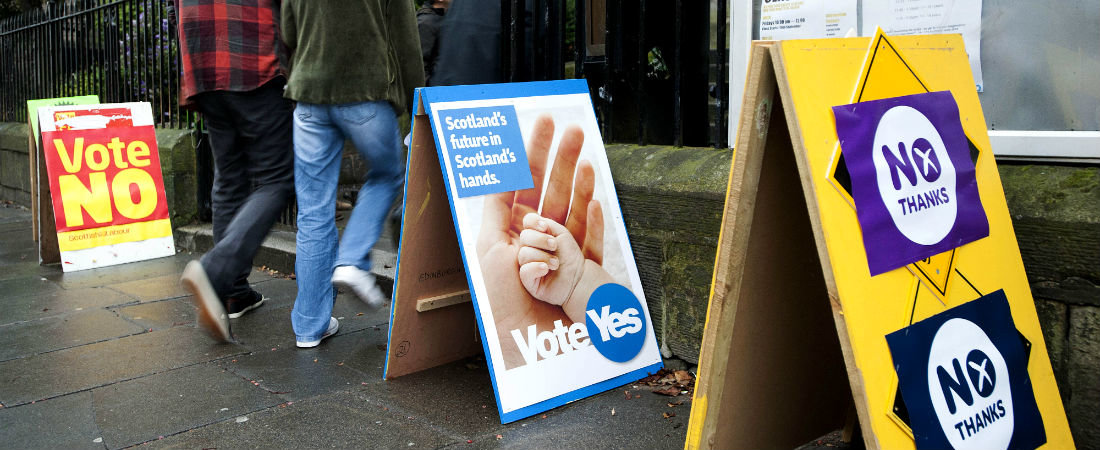![]() Achieved
Achieved
- ‘No’ vote in the Scottish referendum
- Smith Commission recommendations delivered
- EVEL options presented
![]() More to do
More to do
- Substantive visible progress with Scottish devolution
- Reach cross-party agreement on settlement for English devolution
![]() The unexpected
The unexpected
- More calls for English regional devolution following the Scottish referendum
- Labour’s Scottish collapse and rise of the SNP
![]() Legacy
Legacy
- The continuation, for now, of the Union
- The rise of the Scottish nationalist and independence movements as major UK political forces
2014 has been a year in which the political battle lines have been redrawn completely, and no issue has had more defining than constitutional reform.
Whether the issue is Scottish independence, the ‘democratic deficit’ or English regional devolution, the UK’s traditional political class is facing the prospect of a significant challenge to the constitutional status quo, driven by widespread public disenchantment and the rise of previously fringe populist parties.
Following the failure of the Coalition to deliver Lords reform, and the public’s rejection of a new electoral system, a much more powerful drive for constitutional reform arose from outside the centre of power.
The Scottish referendum encapsulated the challenge facing the main three Westminster parties. The final weeks of the campaign in Scotland were jittery and uncertain, and the polls swung back into safe territory only as the result of hasty-seeming promises of unprecedented devolution.
Even having lost the vote and their talismanic leader, the SNP remain on the front foot. If current polling holds up, Scotland will become virtually a one-party state: Labour has been predicted to lose all but four Scottish seats in Westminster on the back of 52% of Scots saying they will vote for the SNP in 2015.
Public anger in Scotland at perceived inaction on constitutional reform in Westminster is fuelling a boom in SNP membership; around 64,000 people have joined the party since the referendum, increasing the party’s size threefold and confirming it as the new third party in the UK. It is a bitter irony for the Liberal Democrats that they, the party that has been most consistently vocal on the need for UK constitutional reform, risk being relegated to the status of a historical footnote as a result of the issue taking centre political stage.
Nonetheless, the momentum is with the SNP, and despite the Smith Commission offering a much bigger package of further powers than was thinkable a few years ago, nationalist accusations that Westminster is dragging its heels are resonating with Scottish voters.
What this means for the UK and its future is uncertain. During the campaign, the three Westminster parties presented a united front and signed up to the devolution timetable. The risk for those in Westminster is balancing the difficulty of managing the complex issues involved with the electoral and political damage that any hint of stalling will cause. This is particularly important given how little parliamentary time is left in the calendar.
Adding to the fallout is a piece of deft political manoeuvring from the Conservatives, who have attempted to tie concessions on Scottish devolution to greater English (and Welsh) home rule and an answer to the West Lothian question.
The late conversion to devolution by the Conservatives is probably just a pragmatic decision to adapt to the moment. They may also have concluded that devolution is a relatively cheap policy for the early years of the next Parliament, leaving the newly installed local executives to make difficult spending decisions. Nevertheless, there is a strong logic to their plan: with the Barnett formula protecting public funds for Scotland at the same time as handing greater powers to Holyrood, for England the deal looks pretty poor if it does not get something in return. The only losers, of course, would be the Labour party.
Labour is furious that the Prime Minister has seized the moment to secure future electoral advantage, but it is Labour that has the bigger problem explaining its position. Ed Miliband’s initial response to the Tory gambit, announced at conference, was to pledge a constitutional convention. This feels very much like stalling tactics, and will have to play out after the decisive moment for Scotland, adding to the sense of unfairness in England.
In the face of all these forces, the status quo seems utterly indefensible. The two questions for 2015 are whether a new Scottish devolution package can be made to stick, and what that means for the rest of the UK.






